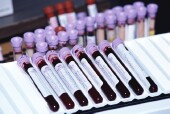
FRIDAY, Feb. 21, 2014 (HealthDay News) — An antibody linked with multiple sclerosis (MS) might be detectable in the blood of people with the disease before symptoms appear, a new study indicates.
The findings could lead to earlier diagnosis and treatment of the central nervous system disorder, the researchers said.
“If our results can be replicated in larger populations, our findings may help to detect MS earlier in a subgroup of patients,” said study author Dr. Viola Biberacher, with Technical University in Munich, Germany. “Finding the disease before symptoms appear means we can better prepare to treat and possibly even prevent those symptoms.”
The researchers analyzed blood samples from 16 blood donors who were later diagnosed with MS and samples from 16 people of the same age and sex who did not develop the disease. The samples were collected two to nine months before the patients first experienced symptoms of MS.
The investigators were looking for an antibody to the KIR4.1 protein, which is found in some people with MS. None of the people without the disease had the antibody. But among those who later developed MS, seven people tested positive for the antibody and two showed borderline activity.
The study, released Feb. 21, is scheduled for presentation at the American Academy of Neurology’s annual meeting in Philadelphia this spring.
“This finding also demonstrates that the antibody development to the KIR4.1 protein, a protein found in some people with MS, precedes the clinical onset of disease suggesting a role of the autoantibody in how the disease develops,” Biberacher said in an academy news release.
Research presented at meetings should be considered preliminary until published in a peer-reviewed medical journal.
More information
The American Academy of Family Physicians has more about multiple sclerosis.
Copyright © 2026 HealthDay. All rights reserved.

